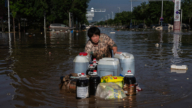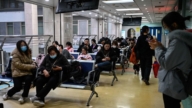【新唐人2013年12月13日訊】中國週日發佈的11月份出口數字大幅飆升,一些觀察者認為因素之一是,公司虛報出口價值,作為規避當局限制將熱錢轉入中國的一個方式。外媒指出,中國境內外利率的大幅差價造成熱錢無孔不入。中共資本控制的這堵牆越來越千瘡百孔。
美國《華爾街日報》12月9號報導說,中國大陸出口虛報發票的情形,在一年之前也曾經發生。而今年 11月份的出口價值同比飆升了12.7%,和使用人民幣進行貿易融資增加,讓一些分析師擔憂企業故伎重演。
總體上中國的利率高於亞洲其他國家,這製造了一個強有力的激勵,讓投資者在國外借貸資金,然後到國內投資。
北京天則經濟研究所所長助理段紹譯:「因為在市場比較發達的國家,它的貸款利息只有2-4%,而中國的貸款利息有6-12%,存款利息在國外是1%以下,中國的存款利息一年定期有3.15%,所以這種利率差也是其中一個原因。」
北京「天則經濟研究所」所長助理段紹譯指出,西方國家是真正的市場經濟國家。市場經濟的價格是由市場來決定的。而中國不是真正的市場經濟,所以資本的價格受到政府的干預影響。特別是政府對土地、資本的管制,人為的扭曲了市場的價格,所以中國的價格表現不真實。
段紹譯:「利率高主要因為中國對金融市場的管制。讓金融市場的資本嚴重的供不應求,中小企業很難貸到銀行的款。比如中國政府每年寧可去買美國的國債,也不借給自己的企業家。它也不允許企業自己使用支付它的外匯。造成人為的稀缺。」
大陸銀行間資金持續緊張的狀況仍未緩解,相關利率與往年相比大幅升高。 12月9號,據上海銀行間同業拆放利率(Shibor)網站顯示,隔夜利率已經達到3.6200%,而在2012年12月10號,隔夜利率僅為2.2490%。
另外,人民幣兌美元即期匯率9 號達到6.0715,再創新高。同一天,人民幣兌美元匯率中間價報6.1130,較前一跤易日繼續大幅上漲102個基點,也再創新記錄。業內人士表示,人民幣匯率本輪升勢可能仍將持續,而境內外匯差、和利差,已經引得更多熱錢通過貿易渠道回流大陸,這個跡象愈發明顯。
除了熱錢流入賺取利率差,段紹譯認為,虛報出口貨值的另外一個重要原因是,當局給予出口的退稅。企業產品賣到國內和國外,它的利潤不一樣。賣到國內要交稅,賣到國外就可以退稅。
段紹譯:「在中國,老百姓上有政策,下有對策。補貼跟走私是一對孿生姊妹。比如說,出口退稅就會讓有些人開假發票,關稅收的高就會讓有些人走私。其實真正解決這個問題的根本原因,是適當降低補貼甚至取消補貼,真正讓中國融入到全球市場當中去。」
《華爾街日報》報導說,公司企業有各種各樣的把戲來規避中共當局的資本控制。公司可以誇大他們的出口價值,或甚至把實體貨物運出海關,然後再走私回來。或者,他們可以使用信用證從香港銀行獲取廉價資金,然後將它們轉回大陸並放在理財產品裡面,直到還款到期的時候。
不管機制如何,它們的目標是一樣的,就是﹕從海外以很低的利率借錢,然後把這些現金投入到高收益的中國投資當中。
《華爾街日報》的報導認為,境內外利率大幅的差異,讓投資者無孔不入的鑽資本控制的漏洞。只要賺取快錢的機會存在,熱錢的流動將繼續找到它跨越國境的方式。報導引述「澳新銀行」專家劉立剛的結論﹕降低利率,可能是中共可以化解資本流入壓力的唯一方式。
但是這讓大陸的央行左右為難。此刻,它正在提高利率,以打擊持續的過度投資,和大規模的債務積聚。
採訪編輯/秦雪 後製/李勇
Dramatic Rise in China Exports Results from Imported Hot Money
Last Sunday, China issued its November
export figures, which showed a dramatic rise.
Some observers attribute the key drive is higher export
values that are fraudulently declared by exporters.
This is a crucial method for transferring laundered
money into China by evading regulations.
International media reported that there is a
significant interest gap between China and
overseas, which attracts pervasive hot money.
The Chinese Communist Party’s wall for controlling
capital has become increasingly full of holes.
According to a Wall Street Journal report on
December 9, fiddling invoices for higher export
values occurred one year ago in China.
This November’s exportation figure was
12.7% higher in comparison to last month.
The increase of trade finance by Renminbi suggests to
some analysts that fiddling export invoices has recurred.
Overall, Chinese interest rates are
higher than other countries in Asia.
This strongly stimulates investors to borrow overseas
money and then to invest in Mainland China.
Duan Shaoyi, Assistant Director of Beijing Unirule
Institute of Economics: “In those countries with
developed market, loan interest rates are only 2-4%.
In China, it’s 6-12%. Similarly, overseas deposit
interest rates are less than 1%, whereas in
China it’s 3.15% for a one year team deposit.
Therefore, such a significant interest gap is one
of the key reasons to drive hot money to flow in."
Duan points out that most western
countries have a real market economy.
Their prices are determined by the market.
However, China is not a real market economy, and
hence capital prices are interfered by the government.
On particular, governmental regulations on land
resources and capital twist the market prices.
So the prices in China are not real ones.
Duan Shaoyi: “High interest rates result from
China’s regulations on the financial market.
This causes a serious shortage of the capital
supply, and difficulties for medium and small
sized enterprises obtaining loans from the bank.
The Chinese Central Government would rather buy
American bonds than lend money to Chinese companies.
Furthermore, the companies are not
allowed to use their foreign currency.
All of these produce an artificial shortage of capital."
Capital shortage tensions among
China’s banks are still not yet resolved.
The relevant interest rates greatly
rise compared to previous years.
December 9, Shibor website showed
overnight interest rate achieved 3.62%.
It was 2.249% on December 10, 2012.
In addition, the spot exchange rate of RMB to USD
on December 9 touched a new record 6.0715.
There was a median exchange rate of RMB
to USD 6.1130, which rose around 102 basis
points compared with the last trading day.
This was also a new record.
Financial practitioners say that the appreciation
trend of RMB will probably last in the near future.
The differences in exchange rates and interest
rates between domestic and international markets
has already attracted a lot more hot money to
return to Mainland China through trade channels.
The signs are increasingly obvious.
According to Mr Duan, in addition to hot money
making a profit by interest rate differences,
another important reason for false high export
values are tax returns policies for export goods.
The products selling on domestic markets
and overseas markets earn different profits.
This is because sales in the domestic market need to pay
tax, whereas they obtain tax returns in the overseas market.
Duan Shaoyi: “In China, people invent countermeasures
to deal with the policies issued by the government.
Subsidies and smuggling go hand in hand.
For example, tax returns for export cause false
invoices, and high custom duties trigger smuggling.
Actually, the fundamental solution to solving this problem
is to moderately lower and even remove these subsides.
This will allow China to really emerge into the global market."
The Wall Street Journal reports that Chinese companies
innovated a number of tricks to escape capital controls.
They can exaggerate export values, or even smuggle back
those goods after they have been exported through customs.
They can also use credit proof to obtain cheap
capital from banks in Hong Kong, and then transfer
the capital back into the Mainland by packing the
money into financial products until the payment term.
No matter what sort of mechanism
they use, the objectives are same.
They borrow overseas money with a very low interest
rate, and invest the cash in high-profit projects in China.
The Wall Street Journal reports that the significant
difference of interest rates between domestic markets
and international markets triggers investors to
pervasively exploit the loopholes in capital control.
As long as there is the chance of rapid making money,
hot money will continue to find its ways across the border.
The report cites the conclusions
by ANZ Bank expert Liu Ligang:
“To reduce interest rates might be the only way for
the CCP to deal with the pressure of capital flowing in."
However, this would plunge the
Mainland Central Bank into a dilemma.
At the moment, it is increasing interest rates
to hit lasting over-investment and the
accumulation of very large scale debts.
Interview & Edit/QinXue Post-Production/LiYong































